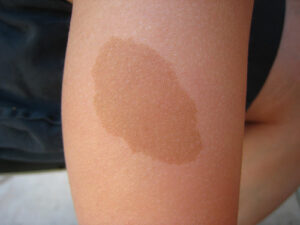- Humidity and allergens in Singapore can trigger sudden rashes or flare chronic conditions.
- Allergies present quickly (hives, swelling); eczema/psoriasis are persistent and scaly. Seek diagnosis via history, exam, possible allergy testing, or skin biopsy.
- Skin rash treatment may include topical/oral meds, moisturisers, and trigger avoidance.
- See a dermatologist if rashes spread, persist, or impair sleep/work.
In Singapore’s humid climate, where allergens and environmental triggers are common, identifying the cause of a rash becomes even more consequential in deciding the treatment course. Here’s how to spot the difference and what to do next.
Common Causes of Skin Rashes
Skin rashes can develop for various reasons. Allergic reactions are often sudden and linked to something new, like a skincare product, detergent, food, or even pollen. These rashes tend to appear as red, itchy patches or hives that may come and go.
On the other hand, chronic skin conditions like eczema, psoriasis, or fungal infections tend to be persistent. They can flare up occasionally, especially during stress, a shift in weather, or exposure to irritants.
Identifying the root cause early can help in selecting the most effective treatment for skin rash and prevent recurring symptoms.
Knowing the Difference
While both allergic reactions and skin conditions can cause redness, itching, and inflammation, there are subtle differences:
- Allergic Reactions: Often appear quickly after exposure. Common signs include hives (raised, red welts), swelling, and intense itching. These reactions may also be accompanied by watery eyes or sneezing.
- Skin Conditions: Tend to develop gradually. Eczema presents with dry, cracked skin and itchiness, while psoriasis often causes thick, scaly patches. These conditions usually require ongoing care rather than a one-off treatment.
When a rash doesn’t improve with over-the-counter remedies or gets worse, it’s time to consult a dermatologist for a detailed diagnosis.
When to See a Dermatologist
If your rash is spreading, painful, or lasts more than a few days, don’t wait it out. A dermatologist can help determine the underlying cause through a clinical evaluation, allergy testing, or skin biopsy if needed.
Timely skin rash treatment is crucial to prevent complications such as infections or long-term skin damage. Depending on the diagnosis, your treatment plan may include topical creams, oral medication, moisturisers, or a change in skincare routine.
What You Can Do in the Meantime
While waiting for your appointment, there are a few things you can do:
- Avoid scratching to prevent infection.
- Use fragrance-free moisturisers.
- Stay away from suspected allergens.
- Keep the affected area clean and dry.
These simple steps can help ease discomfort until a tailored treatment plan is in place.
Take the Next Step Towards Healthier Skin
Skin rashes can be more than just a surface issue. They’re often a sign of something more serious. Whether it’s an allergy or a chronic condition, the correct diagnosis leads to better outcomes. If you’re unsure about what’s causing your rash or need expert skin rash treatment, book a consultation at the About Dermatology Clinic for personalised, professional care.










